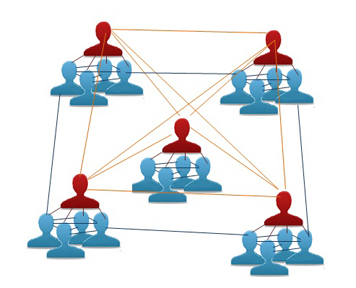We were talking about the top executives in his organisation when my interviewee sighed. “I just don’t know why anyone would want to take on those roles.”
I stopped cold. This talented professional was clearly on his company’s ‘high potential’ list – they were investing heavily in his development in all the traditional ways. “Ah, don’t you think your company expects you to take on those roles?” I asked.
He smiled. “Probably. But I have no interest in that.”
What? You don’t want to be the leader?
I find more and more 30- and 40-somethings are feeling this way. I suspect many companies’ succession pipelines are actually pipe dreams – filled with people whose see their futures evolving in very different ways than along traditional corporate career paths. Why?
I don’t find that this view reflects an unwillingness to take on responsibility. Rather, for many, it signals concern that today’s complex and ambiguous conditions seem unlikely to respond to the old school of leadership – and an unwillingness to mimic traditional leadership norms. Old practices were honed in a different environment – one in which it was perhaps easier to view one position as right and the other wrong, easier to predict, to forecast, to control. Many notions of leadership remain deeply embedded in the conditions and assumptions of the past.
Today, leadership is less about being the best than about creating a context in which others can succeed. Through my research, I have defined four key roles of a contextual leadership:
- Building the organisation’s collaborative capacity – ‘wiring’ the organisation, literally and figuratively, in ways that allow the easy flow of information and ideas throughout
- Disrupting with diversity – ensuring that the organisation has a continual infusion of new perspectives – that its people are immersed in, rather than protected from, the complexities of today’s world – and that there is an appreciation of the value of diverse points of view
- Asking great questions – framing the challenges facing the business in ways that are evocative and inspiring – ways that invite the broad organisation to invest in creating innovative solutions
- Conveying meaning required to tap discretionary effort – understanding what makes being part of this organisation special, why people choose to work here, and what we must provide in return to maintain their commitment and passion for the work at hand.
Recasting leadership along these lines is important for the success of our organisations. And rethinking our approaches to development is essential to keep up-and-coming future leaders on a corporate path.
How do we help individuals develop the skills necessary to provide contextual leadership? What are the implications for leadership development?
Help them:
- Build their own network and appreciate the role connections play in today’s world – provide talented individuals with the opportunity to form strong, trust-based relationships with others throughout your organisation. Don’t pit peers against each other. Make extensive use of project-based work, encouraging teams to form and re-form across the organisation.
- Understand their own biases – and appreciate the value of diverse points of view – expose individuals to the varying logic and legitimacy diverse individuals. Help them understand how history has shaped our ideas of ‘normal.’ Ensure that they develop insight into their own biases.
- Create paradigms for shaping questions, for making sense out of seemingly overwhelming and disparate data – help them develop a ‘tool box’ of frameworks for sense making. Create exercises, perhaps using computer simulations, to put them at the helm of organisations in complex circumstances. Allow them to experience how their daily decisions can affect the business as a whole.
- Connect with their authentic selves – what they care about, what they value – what they want to share with others – give them time and guidance to discover their own values. Move out of the classroom and out of their comfort zone.
——————————————————————————–
Erickson is teaching on the Leading Businesses into the Future Programme at London Business School in June 2014.


